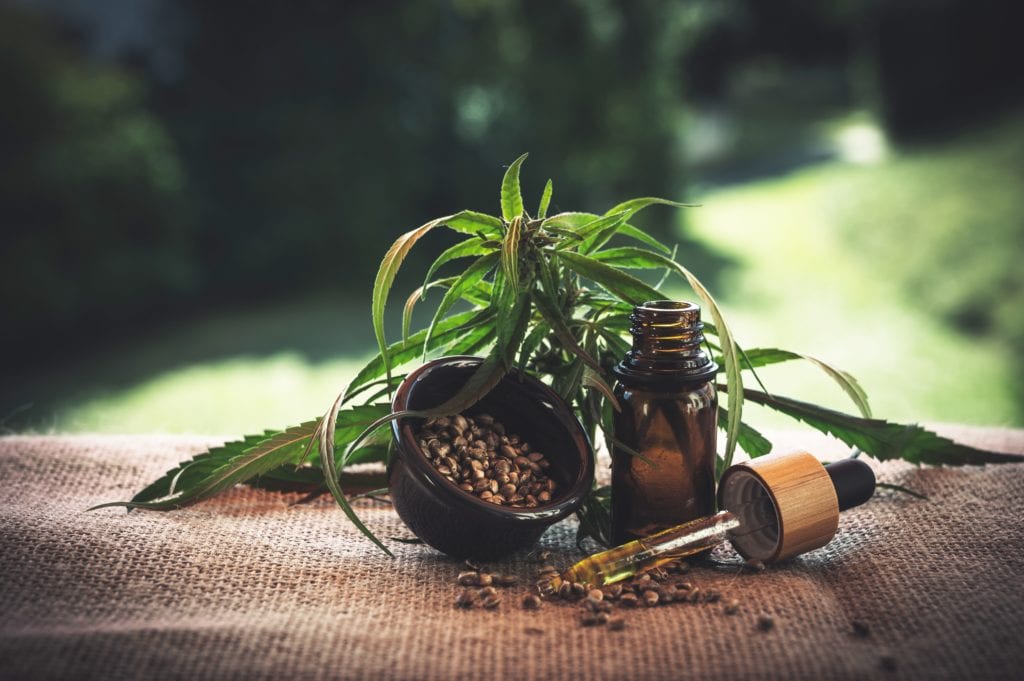
Priscilla Agoncillo, president of the Cannabinoid Industry Association, says the CBD market is poised for massive growth.
The cannabidiol (CBD) market is growing rapidly. The market is also preparing for industry regulations from the U.S. Food and Drug Administration as well as the possibility of changing rules under a new hemp bill winding its way through the U.S. Congress. Speaking during an online forum presented by TMG, a tobacco media group, Priscilla Agoncillo, president of the Cannabinoid Industry Association (CBDIA), outlined the current state of the CBD industry and what manufacturers, retailers and consumers can expect through 2021.
Estimates by New Frontier Data say the CBD market will increase from $390 million in 2018 to $1.3 billion in 2022. Additional research by BDS Analytics and ArcView Market Research suggests that CBD sales will reach more than $20 billion in 2024. CBD already comes in numerous forms, such as oils, tinctures, capsules, edibles, even topicals and cosmetics. CBD products also are expected to expand into infused beverages, suppositories, sprays, inhalers and a wide variety of hemp smokable products, according to Agoncillo. There will also be a significant increase in cosmetics and supplements that contain CBD as well as more novel drugs introduced as companies expand research and development efforts.
“In distribution channels, despite strict rules and regulations, the number of dispensaries and authorized retail storefronts that sell cannabis-based products to consumers will be opening due to new regions and states legalizing (marijuana) to meet the demand of consumers,” Agoncillo said. “Additionally, with the increase of product types, more big-box retailers will be stocking more CBD products and fostering relationships with CBD companies in research and development.”
Agoncillo expects the popularity of CBD products to continue to grow as the scientific evidence of CBD’s benefits comes to light. The research and findings will also boost efforts by companies looking to introduce new products and develop new uses for various types on cannabinoids, which will increase integration with new technology and delivery systems. There are currently an estimated 104 cannabinoids in the cannabis plant.
Looking at the top CBD trends in 2021, Agoncillo says that niche market efforts will become larger and more formalized as brands continue to seek out less crowded consumer segments. This will further diversify and differentiate each brand and allow for businesses to achieve higher returns on investments (ROIs) on exploratory segmented marketing efforts.
“Brands will move toward proven consumer packaged goods (CPG) models focused on brand family extensions, including the marriage of complementary products and product iterations. Companies will work towards developing diversified portfolios and specific consumer segmentation,” she said.” You will see brands that will follow the Procter & Gamble family of brands business model or create line extensions of existing brands.”

Moving forward, Agoncillo says that the success of the CBD market will be predicated on understanding consumer market entry and adoption trends. According to High Yield Insights, CBD gummies are the entry point for most new consumers (at a rate of 60 percent) before trying other types of CBD products. Another growing entry point is CBD-infused beverages. A recent CBD beverage study released by High Yield Insights and Innovate MR revealed just how much legroom there is in the CBD beverage segment, according to Agoncillo. Among 4,200 survey respondents, only 28 percent report finding “a CBD product brand or format that works for them,” according to the research.
“We project exponential growth in this segment [along with increased] diversity and inclusivity. Asian, Black and Hispanic consumer marketing efforts will support cultural competence, particularly among the nation’s largest brands,” said Agoncillo, citing her organization’s market expectations. “We expect to see more focus on niche marketing as consumer brand loyalty shifts toward the brands that consumers believe, respect and understand. More brands will concentrate on the growth opportunities within the Asian, Black and Hispanic consumer market, which have remained relatively untapped by CBD companies. One of the first signals of brand dominance in this segment market is the introduction of unique campaigns, specifically built to appeal to Black and Hispanic consumers, as well as Spanish-language advertising, packaging and support.”
Exploding anxiety rates and associated mental health issues, especially surrounding the Covid-19 pandemic, will also provide hemp and CBD brands with new opportunities to promote the efficacy of CBD. Agoncillo says her organization is seeing increased focus on this niche market, which can be tricky to navigate due to advertising restrictions.
“Brands are finding value in workarounds that allow them to leap over ad restrictions via targeted keyword searches; 25 percent of new market entrants purchased CBD to cope with pandemic-related stress and anxiety,” she said. According to High Yield Insights, more than 83 percent of U.S. employees reported mental health issues during 2021, and over 67 percent of U.S. employers project another mental health crisis within the next two years.
“We project heightened partnership and growth opportunities in CBD products focused on stress, anxiety and sleep. Staying ahead in CBD as a highly regulated, newly developing industry, it is important that you obtain legal counsel to assist in the understanding of changes in regulations as well as to help you keep up with the constantly changing atmosphere,” explained Agoncillo. “Keep your company in compliance with regulations, always. As many of the regulations have not been finalized to cover the entirety of the CBD industry, it is safer to always err on the side of caution by operating your company according to GMP and other top-tiered standards.”
New regulations for the CBD industry are also on the horizon. Draft rules from the FDA are currently with the White House’s Office of Management and Budget; however, review of those rules is currently being postponed by the Biden administration. Agoncillo says that no one in the industry knows exactly what those rules entail.
“It’s very interesting because I remember when that report came out; it was back in October 2020, and the media would contact us and ask for our opinions on what that report was and what the regulations are. The truth is that they didn’t release it to anyone,” she says. “Through the CBDIA, we have a lobbyist in Washington that’s dialed in and has his finger on the pulse of everything that’s happening. And they haven’t shown what those regulations are to anyone. However, we do know that it is suggested that things are moving towards GMP standards. In the U.K., they’ve adopted the novel foods application for their CBD products. They’ve moved full steam ahead there. So there’s a suggestion that it might follow that closely. But obviously, we don’t know until they actually come out. This is why it’s really important to be involved with different industry associations and different organizations because they are going to be the first to get the word of how it’s going to actually roll out.”
Another legislative change is brewing in the U.S. Congress. On Feb. 4, 2021, Congress introduced another CBD deregulation bill, H.R. 841—the Hemp and Hemp-Derived CBD Consumer Protection and Market Stabilization Act of 2021. If passed, the bill would legalize the marketing of hemp, CBD or any other ingredient derived from hemp in a dietary supplement, provided the supplement satisfies other applicable requirements. The bill is in committee as of this writing.
Agoncillo says another important part of the success of a CBD business is participating and supporting the community. She says that owners can help their company succeed by joining and being active in relevant cannabinoid-related industry associations, attending and being present at key conferences and crafting business outreach accordingly. Owners also need to hire the right staff to help them grow.
“Keep your CBD company ahead by staying on top of the latest medical research and/or participating in the R&D to further advance the science of CBD and the industry as a whole. Hire talent with five-plus years in the cannabis or hemp industry to help navigate through the development of the CBD segment of your business model,” she says. “You will need a seasoned insider that understands the culture and can effectively translate that to your company.”
Experienced staff can help guide business owners through the smoke and mirrors to avoid pitfalls, harmful partnerships and assist in forming a proper strategy for a business model. Additionally, experienced talent will have key relationships and resources in place to assist in executing business endeavors, according to Agoncillo.
“We need high-operating brands and companies out there to apply their talents and their products and their technologies into the CBD space. The consumers need it,” she says. “We want it. And there’s no better time to really sink your teeth into this industry. And it’s very exciting because we can form this industry into what we need it to be.”

